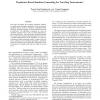Free Online Productivity Tools
i2Speak
i2Symbol
i2OCR
iTex2Img
iWeb2Print
iWeb2Shot
i2Type
iPdf2Split
iPdf2Merge
i2Bopomofo
i2Arabic
i2Style
i2Image
i2PDF
iLatex2Rtf
Sci2ools
120
click to vote
AAAI
2007
2007
Population-Based Simulated Annealing for Traveling Tournaments
This paper reconsiders the travelling tournament problem, a complex sport-scheduling application which has attracted significant interest recently. It proposes a population-based simulated annealing algorithm with both intensification and diversification. The algorithm is organized as a series of simulated annealing waves, each wave being followed by a macro-intensification. The diversification is obtained through the concept of elite runs that opportunistically survive waves. A parallel implementation of the algorithm on a cluster of workstations exhibits remarkable results. It improves the best known solutions on all considered benchmarks, sometimes reduces the optimality gap by about 60%, and produces novel best solutions on instances that had been stable for several years.
AAAI 2007 | Intelligent Agents | Simulated Annealing | Simulated Annealing Algorithm | Simulated Annealing Waves |
| Added | 02 Oct 2010 |
| Updated | 02 Oct 2010 |
| Type | Conference |
| Year | 2007 |
| Where | AAAI |
| Authors | Pascal Van Hentenryck, Yannis Vergados |
Comments (0)

